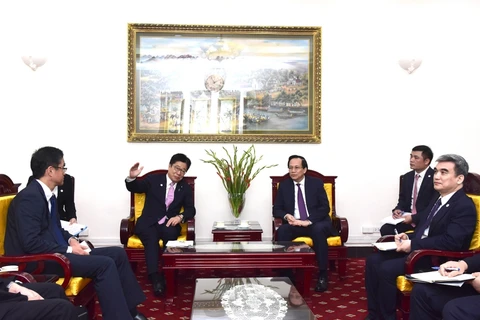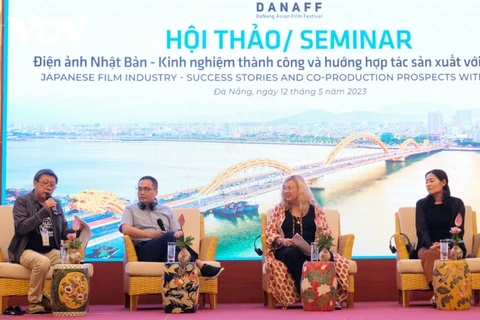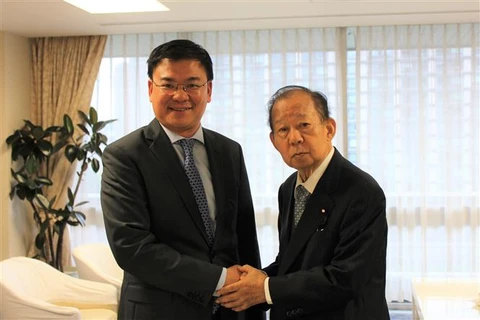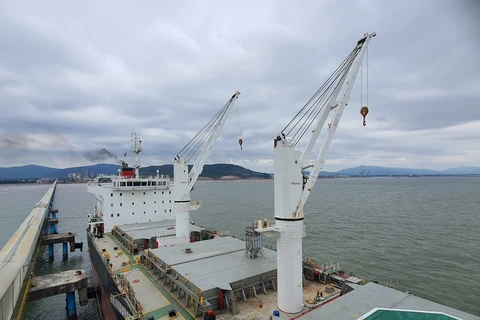Hanoi (VNA) – Prime Minister Pham Minh Chinh will lead a high-ranking delegation of Vietnam to attend the expanded summit of the Group of Seven (G7) and pay a working visit to Japan from May 19-21 at the invitation of Japanese Prime Minister Kishida Fumio.
On this occasion, Japanese Ambassador to Vietnam Yamada Takio granted an interview to the Vietnam News Agency (VNA). The following is the full text of the interview.
Reporter: The Japanese government has invited Vietnamese leaders to attend the G7 Summit in Hiroshima scheduled for May 20-21. Can you share your thoughts on why Japan is interested in having Vietnam participate in these significant events, in addition to the long-standing relationship between the two nations?
Ambassador Yamada Takio: The reason Japan extended an invitation to Vietnam to attend the expanded G7 Summit is due to Vietnam's significance as an important and essential partner in realising the objectives of Japan's Free and Open Pacific (FOIP) strategy, particularly in the Indian Ocean Region. Vietnam possesses the ability and determination to actively contribute to resolving key global issues that are expected to be raised during this G7 Summit in Hiroshima, Japan.
Among the member countries of ASEAN, only Indonesia, as the ASEAN Chair 2023, and Vietnam have been invited to participate in this G7 Summit. In addition to Vietnam, the invitation has also been extended to Brazil, the Republic of Korea, and Australia, countries that are not chairs of regional or international forums or cooperation mechanisms. These invitations highlight Japan's significant emphasis on cooperating with Vietnam.
Moreover, Japan and Vietnam reached an agreement during a high-level online conversation held in February 2023 between Prime Minister Kishida Fumio of Japan and General Secretary Nguyen Phu Trong of the Central Committee of the Communist Party of Vietnam. They agreed to elevate their existing extensive strategic partnership to a new level this year.
The invitation extended to Vietnam to attend this G7 Summit marks a crucial milestone in upgrading the partnership between Japan and Vietnam. It also serves as a driving force for advancing this partnership to new heights.
Reporter: As the host country, what contributions does Japan hope Vietnam will bring to the event to ensure its success for all participants?
Ambassador Yamada Takio: Japan's invitation to Vietnam to attend the G7 Summit in Hiroshima serves as a clear affirmation of Vietnam's crucial role as an important and indispensable partner in the realisation of Japan's Free and Open Pacific (FOIP) vision. It also reflects Japan's deep respect and appreciation for Vietnam’s sincere commitment to actively and constructively contribute to addressing global challenges.
The forthcoming G7 Summit in Hiroshima is expected to prioritise the discussion of climate change, which is recognised as a key issue requiring international consensus and resolution. In this regard, Vietnam’s strong political commitment to this sector, demonstrated by the Government of Vietnam’s ambitious goal of achieving net zero emissions by 2050, positions Vietnam as a significant contributor to the deliberations on this pressing matter at the G7 meeting.
Reporter: During the G7 Ministers' Meeting on Climate, Energy, and Environment held in Sapporo, Hokkaido, in April this year, member countries made a commitment to accelerate the transition to clean energy and achieve net-zero greenhouse gas (GHG) emissions no later than 2050. Similarly, at COP26, Vietnam’s Prime Minister pledged to achieve net-zero emissions by 2050 and reduce emissions by 30% by 2030 compared to 2020 levels. Considering this, what steps do you believe Japan can take to assist Vietnam in fulfilling its pledge?
Ambassador Yamada Takio: As climate change remains a pressing global issue, it is anticipated that it will be a significant topic of discussion at the G7 Summit in Hiroshima, led by Prime Minister Kishida. This issue requires active and collective efforts from the international community.
Vietnam, despite experiencing steady economic growth in recent years, continues to face climate-related disasters annually. In response to this situation, Prime Minister Pham Minh Chinh announced an ambitious target of achieving net-zero emissions by 2050 during COP26. Vietnam is actively promoting a green transition through policies that prioritise the development of green energy, clean energy, and a green economy.
The Government of Japan will lend its support to Vietnam’s efforts in energy transition, particularly in areas such as biomass, hydrogen, ammonia, and CCUS (Carbon Capture, Utilization, and Storage). This support will be channeled through the "Asian Zero Emissions Community” initiative (AZEC)," taking into account the specific circumstances of Vietnam’s economy. Additionally, Japan will collaborate with partner countries to facilitate the decarbonisation process through initiatives like the "Japan Energy Transition Partnership (JETP)," which promotes fair energy exchange and renewable energy.
Furthermore, in terms of digital transformation, Japan recognises the achievements of many Vietnamese enterprises in the IT sector. Vietnam possesses strengths such as a talented and young scientific workforce, technical staff, proficient IT engineers, and a positive business mindset. This opens up opportunities for novel forms of cooperation between Japan and Vietnam, particularly in areas like digital transformation in the manufacturing industry, where Vietnamese IT engineers have developed software tailored for this sector.
By leveraging these strengths and exploring collaborative avenues, Japan and Vietnam can advance their partnership while addressing climate change and fostering digital transformation.
Reporter: This year marks the 50th anniversary of the establishment of diplomatic relations between Japan and Vietnam, and you have been in Vietnam for more than three years now. Which areas of bilateral cooperation do you find most pleasing, and in which areas do you believe the two countries can further strengthen their ties?
Ambassador Yamada Takio: Vietnam is a vital and indispensable partner in Japan's pursuit of a Free and Open Indo-Pacific (FOIP). Japan firmly believes that in collaboration with Vietnam, they can foster robust cooperation mechanisms that contribute to peace and prosperity in the region.
Currently, Japan-Vietnam relations have reached an unprecedented level of development. In the realm of economics, as both countries commemorate the 50th anniversary of their diplomatic ties in 2023, the Japanese government is committed to facilitating increased investment by Japanese enterprises in Vietnam. These investments have significantly contributed to Vietnam’s economic growth thus far, and Japan aims to further invigorate this partnership. Furthermore, Japan seeks to restore the Official Development Assistance (ODA) programme for Vietnam, which had been previously discontinued in 2017. This restoration would focus on supporting infrastructure development and enhancing Vietnam’s investment environment, thereby creating favourable conditions for the country's continued economic progress.
Japan also looks forward to strengthening cooperation in various areas, including green transformation (GX), digital transformation (DX), modernisation, industrialisation, and human resource development in Vietnam. By deepening collaboration in these fields, both nations can drive sustainable growth and advance their respective goals.
In the face of an increasingly challenging security environment, it is essential to underscore the growing significance of security and defence cooperation between Japan and Vietnam. The active participation of Japanese enterprises in the Vietnam International Defence Exhibition 2022, held in Hanoi in December 2022, highlights the emerging potential for collaboration in the field of defence and security between the two countries. As we enter 2023, I am hopeful that this year will witness the tangible advancement of cooperation activities in the realm of security and defence between Japan and Vietnam.
Building upon the agreements reached between the senior leaders of both countries during the online conversation between Prime Minister Kishida Fumio of Japan and General Secretary Nguyen Phu Trong of the Central Committee of the Communist Party of Vietnam in February 2023, I am determined to elevate Japan-Vietnam relations to a new level of significant development. This comprehensive strategic partnership extends not only bilaterally but also extends its influence regionally and globally.
Reporter: In your opinion, what areas need improvement in Vietnam in order to attract more Japanese businesses in particular and businesses in general?
Ambassador Yamada Takio: Vietnam has demonstrated remarkable success in attracting investments from various countries, and I hold high regard for Vietnam’s proactive engagement in economic partnership frameworks, such as the Comprehensive and Progressive Agreement for Trans-Pacific Partnership (CPTPP), as well as its ongoing efforts to eliminate barriers to entry.
According to surveys conducted among Japanese businesses, Vietnam is recognised as the world's most appealing and favoured investment destination. Nevertheless, Vietnam still faces certain challenges that need to be addressed.
Firstly, there is a need for further improvement in infrastructure. Enhancing transportation and energy infrastructure will significantly enhance Vietnam’s appeal as a market for Japanese investors. In particular, there is ample room for development in areas such as highways, railways, and other transport infrastructure.
Secondly, there is a concern regarding procedural issues. Japanese investors have reported delays and uncertainties related to procedures and regulations. It is my hope that Vietnam will exert additional efforts to address and improve these matters, creating a more streamlined and efficient environment for investment.
Reporter: What aspects of Vietnam do you particularly enjoy?
Ambassador Yamada Takio: Throughout my tenure of three years and one month in Vietnam, I had the privilege of visiting various regions spanning from the North to the South, both for business and personal reasons. Each locality possesses its own distinct charm, and I am profoundly impressed by the country's diverse culture and breathtaking natural beauty. Having previously served as a UNESCO ambassador, I had numerous opportunities to explore Vietnam’s cultural heritage, and I am particularly captivated by its awe-inspiring landscapes and rich cultural traditions.
Furthermore, I have had the pleasure of meeting numerous Vietnamese individuals. Interactions with the cheerful and generous Vietnamese people have left me feeling energised. The country is home to many remarkable and hardworking individuals, and it is the indomitable spirit and dedication of the Vietnamese people that have driven the country's vitality and progress.
The Vietnamese community in Japan is approximately 490,000, making it the second-largest expatriate community. Over the past decade, the Vietnamese community has grown nine-fold and has actively contributed across various fields. This dynamic exchange of human resources has laid a solid foundation for the relationship between our two nations.
I am drawn to the similarities and close ties between Japan and Vietnam in numerous aspects, including cuisine, lifestyle, fashion, music, and more. In my view, the understanding and empathy shared between people serve as the bedrock for the development of Japan-Vietnam relations. As an ambassador, my aim is to create numerous opportunities for the Vietnamese people to recognise and reaffirm these shared values and deepen our bilateral ties.
Reporter: Thank you for your interview./.
On this occasion, Japanese Ambassador to Vietnam Yamada Takio granted an interview to the Vietnam News Agency (VNA). The following is the full text of the interview.
Reporter: The Japanese government has invited Vietnamese leaders to attend the G7 Summit in Hiroshima scheduled for May 20-21. Can you share your thoughts on why Japan is interested in having Vietnam participate in these significant events, in addition to the long-standing relationship between the two nations?
Ambassador Yamada Takio: The reason Japan extended an invitation to Vietnam to attend the expanded G7 Summit is due to Vietnam's significance as an important and essential partner in realising the objectives of Japan's Free and Open Pacific (FOIP) strategy, particularly in the Indian Ocean Region. Vietnam possesses the ability and determination to actively contribute to resolving key global issues that are expected to be raised during this G7 Summit in Hiroshima, Japan.
Among the member countries of ASEAN, only Indonesia, as the ASEAN Chair 2023, and Vietnam have been invited to participate in this G7 Summit. In addition to Vietnam, the invitation has also been extended to Brazil, the Republic of Korea, and Australia, countries that are not chairs of regional or international forums or cooperation mechanisms. These invitations highlight Japan's significant emphasis on cooperating with Vietnam.
Moreover, Japan and Vietnam reached an agreement during a high-level online conversation held in February 2023 between Prime Minister Kishida Fumio of Japan and General Secretary Nguyen Phu Trong of the Central Committee of the Communist Party of Vietnam. They agreed to elevate their existing extensive strategic partnership to a new level this year.
The invitation extended to Vietnam to attend this G7 Summit marks a crucial milestone in upgrading the partnership between Japan and Vietnam. It also serves as a driving force for advancing this partnership to new heights.
Reporter: As the host country, what contributions does Japan hope Vietnam will bring to the event to ensure its success for all participants?
Ambassador Yamada Takio: Japan's invitation to Vietnam to attend the G7 Summit in Hiroshima serves as a clear affirmation of Vietnam's crucial role as an important and indispensable partner in the realisation of Japan's Free and Open Pacific (FOIP) vision. It also reflects Japan's deep respect and appreciation for Vietnam’s sincere commitment to actively and constructively contribute to addressing global challenges.
The forthcoming G7 Summit in Hiroshima is expected to prioritise the discussion of climate change, which is recognised as a key issue requiring international consensus and resolution. In this regard, Vietnam’s strong political commitment to this sector, demonstrated by the Government of Vietnam’s ambitious goal of achieving net zero emissions by 2050, positions Vietnam as a significant contributor to the deliberations on this pressing matter at the G7 meeting.
Reporter: During the G7 Ministers' Meeting on Climate, Energy, and Environment held in Sapporo, Hokkaido, in April this year, member countries made a commitment to accelerate the transition to clean energy and achieve net-zero greenhouse gas (GHG) emissions no later than 2050. Similarly, at COP26, Vietnam’s Prime Minister pledged to achieve net-zero emissions by 2050 and reduce emissions by 30% by 2030 compared to 2020 levels. Considering this, what steps do you believe Japan can take to assist Vietnam in fulfilling its pledge?
Ambassador Yamada Takio: As climate change remains a pressing global issue, it is anticipated that it will be a significant topic of discussion at the G7 Summit in Hiroshima, led by Prime Minister Kishida. This issue requires active and collective efforts from the international community.
Vietnam, despite experiencing steady economic growth in recent years, continues to face climate-related disasters annually. In response to this situation, Prime Minister Pham Minh Chinh announced an ambitious target of achieving net-zero emissions by 2050 during COP26. Vietnam is actively promoting a green transition through policies that prioritise the development of green energy, clean energy, and a green economy.
The Government of Japan will lend its support to Vietnam’s efforts in energy transition, particularly in areas such as biomass, hydrogen, ammonia, and CCUS (Carbon Capture, Utilization, and Storage). This support will be channeled through the "Asian Zero Emissions Community” initiative (AZEC)," taking into account the specific circumstances of Vietnam’s economy. Additionally, Japan will collaborate with partner countries to facilitate the decarbonisation process through initiatives like the "Japan Energy Transition Partnership (JETP)," which promotes fair energy exchange and renewable energy.
Furthermore, in terms of digital transformation, Japan recognises the achievements of many Vietnamese enterprises in the IT sector. Vietnam possesses strengths such as a talented and young scientific workforce, technical staff, proficient IT engineers, and a positive business mindset. This opens up opportunities for novel forms of cooperation between Japan and Vietnam, particularly in areas like digital transformation in the manufacturing industry, where Vietnamese IT engineers have developed software tailored for this sector.
By leveraging these strengths and exploring collaborative avenues, Japan and Vietnam can advance their partnership while addressing climate change and fostering digital transformation.
Reporter: This year marks the 50th anniversary of the establishment of diplomatic relations between Japan and Vietnam, and you have been in Vietnam for more than three years now. Which areas of bilateral cooperation do you find most pleasing, and in which areas do you believe the two countries can further strengthen their ties?
Ambassador Yamada Takio: Vietnam is a vital and indispensable partner in Japan's pursuit of a Free and Open Indo-Pacific (FOIP). Japan firmly believes that in collaboration with Vietnam, they can foster robust cooperation mechanisms that contribute to peace and prosperity in the region.
Currently, Japan-Vietnam relations have reached an unprecedented level of development. In the realm of economics, as both countries commemorate the 50th anniversary of their diplomatic ties in 2023, the Japanese government is committed to facilitating increased investment by Japanese enterprises in Vietnam. These investments have significantly contributed to Vietnam’s economic growth thus far, and Japan aims to further invigorate this partnership. Furthermore, Japan seeks to restore the Official Development Assistance (ODA) programme for Vietnam, which had been previously discontinued in 2017. This restoration would focus on supporting infrastructure development and enhancing Vietnam’s investment environment, thereby creating favourable conditions for the country's continued economic progress.
Japan also looks forward to strengthening cooperation in various areas, including green transformation (GX), digital transformation (DX), modernisation, industrialisation, and human resource development in Vietnam. By deepening collaboration in these fields, both nations can drive sustainable growth and advance their respective goals.
In the face of an increasingly challenging security environment, it is essential to underscore the growing significance of security and defence cooperation between Japan and Vietnam. The active participation of Japanese enterprises in the Vietnam International Defence Exhibition 2022, held in Hanoi in December 2022, highlights the emerging potential for collaboration in the field of defence and security between the two countries. As we enter 2023, I am hopeful that this year will witness the tangible advancement of cooperation activities in the realm of security and defence between Japan and Vietnam.
Building upon the agreements reached between the senior leaders of both countries during the online conversation between Prime Minister Kishida Fumio of Japan and General Secretary Nguyen Phu Trong of the Central Committee of the Communist Party of Vietnam in February 2023, I am determined to elevate Japan-Vietnam relations to a new level of significant development. This comprehensive strategic partnership extends not only bilaterally but also extends its influence regionally and globally.
Reporter: In your opinion, what areas need improvement in Vietnam in order to attract more Japanese businesses in particular and businesses in general?
Ambassador Yamada Takio: Vietnam has demonstrated remarkable success in attracting investments from various countries, and I hold high regard for Vietnam’s proactive engagement in economic partnership frameworks, such as the Comprehensive and Progressive Agreement for Trans-Pacific Partnership (CPTPP), as well as its ongoing efforts to eliminate barriers to entry.
According to surveys conducted among Japanese businesses, Vietnam is recognised as the world's most appealing and favoured investment destination. Nevertheless, Vietnam still faces certain challenges that need to be addressed.
Firstly, there is a need for further improvement in infrastructure. Enhancing transportation and energy infrastructure will significantly enhance Vietnam’s appeal as a market for Japanese investors. In particular, there is ample room for development in areas such as highways, railways, and other transport infrastructure.
Secondly, there is a concern regarding procedural issues. Japanese investors have reported delays and uncertainties related to procedures and regulations. It is my hope that Vietnam will exert additional efforts to address and improve these matters, creating a more streamlined and efficient environment for investment.
Reporter: What aspects of Vietnam do you particularly enjoy?
Ambassador Yamada Takio: Throughout my tenure of three years and one month in Vietnam, I had the privilege of visiting various regions spanning from the North to the South, both for business and personal reasons. Each locality possesses its own distinct charm, and I am profoundly impressed by the country's diverse culture and breathtaking natural beauty. Having previously served as a UNESCO ambassador, I had numerous opportunities to explore Vietnam’s cultural heritage, and I am particularly captivated by its awe-inspiring landscapes and rich cultural traditions.
Furthermore, I have had the pleasure of meeting numerous Vietnamese individuals. Interactions with the cheerful and generous Vietnamese people have left me feeling energised. The country is home to many remarkable and hardworking individuals, and it is the indomitable spirit and dedication of the Vietnamese people that have driven the country's vitality and progress.
The Vietnamese community in Japan is approximately 490,000, making it the second-largest expatriate community. Over the past decade, the Vietnamese community has grown nine-fold and has actively contributed across various fields. This dynamic exchange of human resources has laid a solid foundation for the relationship between our two nations.
I am drawn to the similarities and close ties between Japan and Vietnam in numerous aspects, including cuisine, lifestyle, fashion, music, and more. In my view, the understanding and empathy shared between people serve as the bedrock for the development of Japan-Vietnam relations. As an ambassador, my aim is to create numerous opportunities for the Vietnamese people to recognise and reaffirm these shared values and deepen our bilateral ties.
Reporter: Thank you for your interview./.
VNA

























